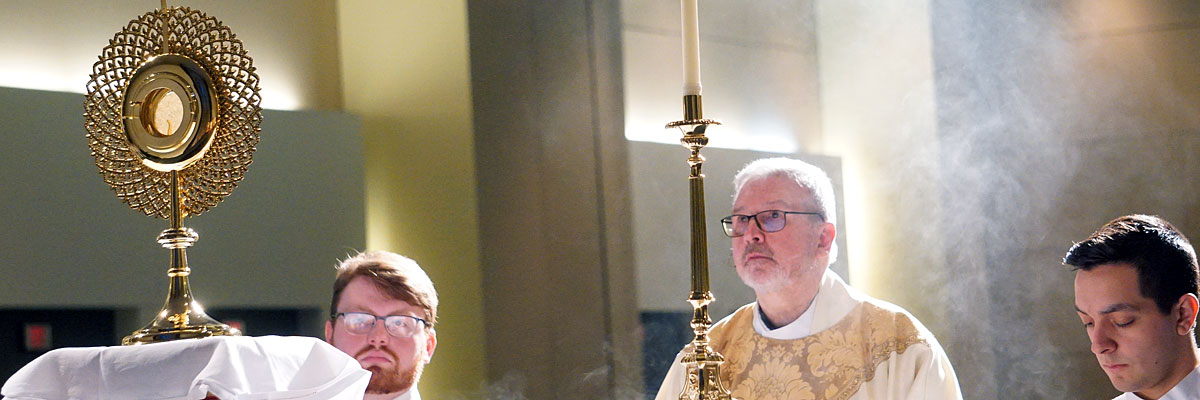Official Website of the
Catholic Diocese of Little Rock
Disciples are Saints Set Apart to Serve
Published: September 6, 2008
This is the fourth column in a 13-part series
By Cackie Upchurch
Director of Little Rock Scripture Study
When writing the church in Philippi, Paul offered his thanks, assured the Philippians of their place in his heart and called the believers “partners with me in grace” (Philippians 1:7). Often depicted as a man who was larger than life with an ego to match, Paul readily praised, thanked and shared the spotlight with others who ministered with him on the road or in their own communities in the name of Christ. Every piece of correspondence that came from Paul or is associated with him includes names of others who were faithfully living in response to the revelation of Jesus Christ in their lives.
 People like Timothy and Titus, Barnabus and Silvanus traveled with him and sometimes went ahead to prepare the way for the Gospel to be preached. Others like Lydia (Acts 16), Phoebe (Romans 16:1), Prisca and Aquila (1 Corinthians 16:19) apparently hosted the Christian community in their homes. These people and many others were companions to Paul as he spread the Gospel.
People like Timothy and Titus, Barnabus and Silvanus traveled with him and sometimes went ahead to prepare the way for the Gospel to be preached. Others like Lydia (Acts 16), Phoebe (Romans 16:1), Prisca and Aquila (1 Corinthians 16:19) apparently hosted the Christian community in their homes. These people and many others were companions to Paul as he spread the Gospel.
First and foremost, Paul was an apostle, one sent by the risen Christ himself to preach the good news. But in order to be sent, one has to learn first to follow. Paul’s own apostleship began with his encounter with the risen Jesus on the road to Damascus (Acts 9) but it was nurtured through his association with other followers of Jesus in Damascus (Acts 9:19), Caesarea (Acts 9:30), Antioch (Acts 11:22f) and eventually with Jesus’ original followers in Jerusalem (Acts 15).
Paul was a disciple (or follower) of Jesus Christ and reveled in making disciples as he journeyed around the Roman Empire. The term disciple does not appear in his writings, but we can draw lessons about discipleship from his correspondence. When he addressed the churches that he founded or planned to visit, Paul would speak to Jesus’ followers in various ways that tell us something about his understanding of discipleship.
For example, in Philippians 3:20 he reminds his companions in Christ that “our citizenship is in heaven.” To Paul, disciples lived in this world in a way that revealed another world where Christ reigned supreme. His letters often included an exhortation to live in such a way that is worthy of the Lord and his Gospel (Ephesians 4:1; Philippians 1:27; Colossians 1:10). This worthiness would be manifest in the virtues of humility, gentleness, patience, humility and the bond of unity. In other words, disciples should be recognizable not just in what they profess but in the way they live.
When Paul addressed followers of Jesus or referred to them he also used the term “saints” or “holy ones” (Romans 1:7; 16:15; 1 Corinthians 1:2; Ephesians 1:1; 2:19). It was obvious to Paul that since all are called to
holiness, each person’s life was to be a response of loving obedience to Christ. Each disciple, though, was called to community and to live a holy life in that context.
The holiness that Paul preaches is not about perfection but about being set apart for service to one another and to the good news of Jesus. Disciples are aware of having been called by God and it is that awareness that shapes the imagination, behavior and belief of Jesus’ followers. In Galatians 4:5-7, Paul offers a powerful image of freedom that also demonstrates the intimacy God desires for those who are in Christ. It is the image of adoption. “As proof that you are children, God sent the spirit of his Son into our hearts, crying out, ‘Abba, Father!’ So you are no longer a slave but a child, and if a child then also an heir, through God.”
The actual term that is translated as “child” is specifically a male term in Greek and would be better translated as “son.” Of course, translators recognize that the lesson Paul gives is meant for both men and women disciples. However, it is important to consider that in the ancient world it was sons who possessed the right of inheritance within a family. Paul’s original audience would have immediately recognized the effects of adoption, of being made a son in a family.
There is a larger consideration as we examine this lesson Paul gives on discipleship. Followers of Jesus, male and female, are not slaves nor are they simply pupils who learn by example and instruction. They have ready access to God, as a child has ready access to a parent. Jesus’ own spirit allows his followers to recognize this intimacy and take on their true identity as sons and daughters of God. Disciples are heirs of God, inheriting and now possessing with Jesus, the very life of God.
Study Questions
- Who would you refer to in your life as “partners with me in grace”?
- What do you think it means to be a disciple of Jesus today? Are you one?
- According to Paul in Galatians 4:5-7, what special proof or their relationship to God does the Holy Spirit provide Jesus’ followers?
- How might you seek greater intimacy with God?
This article was originally published in Arkansas Catholic Sept. 6, 2008. Copyright Diocese of Little Rock. All rights reserved. This article may be copied or redistributed with acknowledgement and permission of the publisher.









